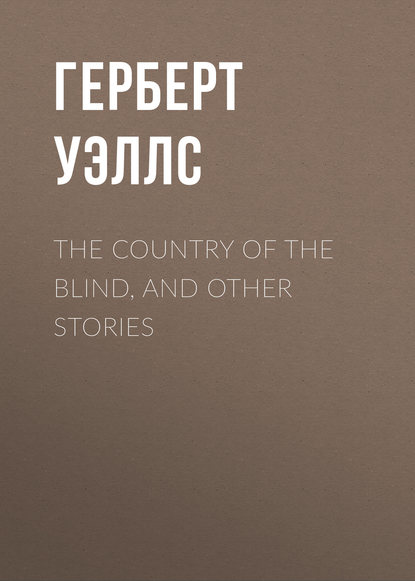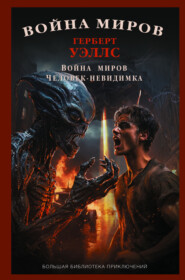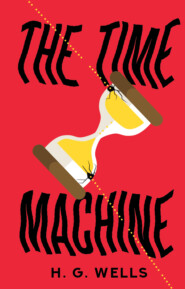По всем вопросам обращайтесь на: info@litportal.ru
(©) 2003-2024.
✖
The Country of the Blind, and Other Stories
Настройки чтения
Размер шрифта
Высота строк
Поля
About midday he came at last out of the throat of the gorge into the plain and the sunlight. He was stiff and weary; he sat down in the shadow of a rock, filled up his flask with water from a spring and drank it down, and remained for a time resting before he went on to the houses.
They were very strange to his eyes, and indeed the whole aspect of that valley became, as he regarded it, queerer and more unfamiliar. The greater part of its surface was lush green meadow, starred with many beautiful flowers, irrigated with extraordinary care, and bearing evidence of systematic cropping piece by piece. High up and ringing the valley about was a wall, and what appeared to be a circumferential water-channel, from which the little trickles of water that fed the meadow plants came, and on the higher slopes above this flocks of llamas cropped the scanty herbage. Sheds, apparently shelters or feeding-places for the llamas, stood against the boundary wall here and there. The irrigation streams ran together into a main channel down the centre of the valley, and this was enclosed on either side by a wall breast high. This gave a singularly urban quality to this secluded place, a quality that was greatly enhanced by the fact that a number of paths paved with black and white stones, and each with a curious little kerb at the side, ran hither and thither in an orderly manner. The houses of the central village were quite unlike the casual and higgledy-piggledy agglomeration of the mountain villages he knew; they stood in a continuous row on either side of a central street of astonishing cleanness; here and there their particoloured facade was pierced by a door, and not a solitary window broke their even frontage. They were particoloured with extraordinary irregularity, smeared with a sort of plaster that was sometimes grey, sometimes drab, sometimes slate-coloured or dark brown; and it was the sight of this wild plastering first brought the word "blind" into the thoughts of the explorer. "The good man who did that," he thought, "must have been as blind as a bat."
He descended a steep place, and so came to the wall and channel that ran about the valley, near where the latter spouted out its surplus contents into the deeps of the gorge in a thin and wavering thread of cascade. He could now see a number of men and women resting on piled heaps of grass, as if taking a siesta, in the remoter part of the meadow, and nearer the village a number of recumbent children, and then nearer at hand three men carrying pails on yokes along a little path that ran from the encircling wall towards the houses. These latter were clad in garments of llama cloth and boots and belts of leather, and they wore caps of cloth with back and ear flaps. They followed one another in single file, walking slowly and yawning as they walked, like men who have been up all night. There was something so reassuringly prosperous and respectable in their bearing that after a moment's hesitation Nunez stood forward as conspicuously as possible upon his rock, and gave vent to a mighty shout that echoed round the valley.
The three men stopped, and moved their heads as though they were looking about them. They turned their faces this way and that, and Nunez gesticulated with freedom. But they did not appear to see him for all his gestures, and after a time, directing themselves towards the mountains far away to the right, they shouted as if in answer. Nunez bawled again, and then once more, and as he gestured ineffectually the word "blind" came up to the top of his thoughts. "The fools must be blind," he said.
When at last, after much shouting and wrath, Nunez crossed the stream by a little bridge, came through a gate in the wall, and approached them, he was sure that they were blind. He was sure that this was the Country of the Blind of which the legends told. Conviction had sprung upon him, and a sense of great and rather enviable adventure. The three stood side by side, not looking at him, but with their ears directed towards him, judging him by his unfamiliar steps. They stood close together like men a little afraid, and he could see their eyelids closed and sunken, as though the very balls beneath had shrunk away. There was an expression near awe on their faces.
"A man," one said, in hardly recognisable Spanish – "a man it is – a man or a spirit – coming down from the rocks."
But Nunez advanced with the confident steps of a youth who enters upon life. All the old stories of the lost valley and the Country of the Blind had come back to his mind, and through his thoughts ran this old proverb, as if it were a refrain —
"In the Country of the Blind the One-eyed Man is King."
"In the Country of the Blind the One-eyed Man is King."
And very civilly he gave them greeting. He talked to them and used his eyes.
"Where does he come from, brother Pedro?" asked one.
"Down out of the rocks."
"Over the mountains I come," said Nunez, "out of the country beyond there – where men can see. From near Bogota, where there are a hundred thousands of people, and where the city passes out of sight."
"Sight?" muttered Pedro. "Sight?"
"He comes," said the second blind man, "out of the rocks."
The cloth of their coats Nunez saw was curiously fashioned, each with a different sort of stitching.
They startled him by a simultaneous movement towards him, each with a hand outstretched. He stepped back from the advance of these spread fingers.
"Come hither," said the third blind man, following his motion and clutching him neatly.
And they held Nunez and felt him over, saying no word further until they had done so.
"Carefully," he cried, with a finger in his eye, and found they thought that organ, with its fluttering lids, a queer thing in him. They went over it again.
"A strange creature, Correa," said the one called Pedro. "Feel the coarseness of his hair. Like a llama's hair."
"Rough he is as the rocks that begot him," said Correa, investigating Nunez's unshaven chin with a soft and slightly moist hand. "Perhaps he will grow finer." Nunez struggled a little under their examination, but they gripped him firm.
"Carefully," he said again.
"He speaks," said the third man. "Certainly he is a man."
"Ugh!" said Pedro, at the roughness of his coat.
"And you have come into the world?" asked Pedro.
"Out of the world. Over mountains and glaciers; right over above there, half-way to the sun. Out of the great big world that goes down, twelve days' journey to the sea."
They scarcely seemed to heed him. "Our fathers have told us men may be made by the forces of Nature," said Correa. "It is the warmth of things and moisture, and rottenness – rottenness."
"Let us lead him to the elders," said Pedro.
"Shout first," said Correa, "lest the children be afraid… This is a marvellous occasion."
So they shouted, and Pedro went first and took Nunez by the hand to lead him to the houses.
He drew his hand away. "I can see," he said.
"See?" said Correa.
"Yes, see," said Nunez, turning towards him, and stumbled against Pedro's pail.
"His senses are still imperfect," said the third blind man. "He stumbles, and talks unmeaning words. Lead him by the hand."
"As you will," said Nunez, and was led along, laughing.
It seemed they knew nothing of sight.
Well, all in good time he would teach them.
He heard people shouting, and saw a number of figures gathering together in the middle roadway of the village.
He found it tax his nerve and patience more than he had anticipated, that first encounter with the population of the Country of the Blind. The place seemed larger as he drew near to it, and the smeared plasterings queerer, and a crowd of children and men and women (the women and girls, he was pleased to note, had some of them quite sweet faces, for all that their eyes were shut and sunken) came about him, holding on to him, touching him with soft, sensitive hands, smelling at him, and listening at every word he spoke. Some of the maidens and children, however, kept aloof as if afraid, and indeed his voice seemed coarse and rude beside their softer notes. They mobbed him. His three guides kept close to him with an effect of proprietorship, and said again and again, "A wild man out of the rock."
"Bogota," he said. "Bogota. Over the mountain crests."
"A wild man – using wild words," said Pedro. "Did you hear that – Bogota? His mind is hardly formed yet. He has only the beginnings of speech."
A little boy nipped his hand. "Bogota!" he said mockingly.
"Ay! A city to your village. I come from the great world – where men have eyes and see."
"His name's Bogota," they said.
"He stumbled," said Correa, "stumbled twice as we came hither."
"Bring him to the elders."
And they thrust him suddenly through a doorway into a room as black as pitch, save at the end there faintly glowed a fire. The crowd closed in behind him and shut out all but the faintest glimmer of day, and before he could arrest himself he had fallen headlong over the feet of a seated man. His arm, outflung, struck the face of someone else as he went down; he felt the soft impact of features and heard a cry of anger, and for a moment he struggled against a number of hands that clutched him. It was a one-sided fight. An inkling of the situation came to him, and he lay quiet.
"I fell down," he said; "I couldn't see in this pitchy darkness."
There was a pause as if the unseen persons about him tried to understand his words. Then the voice of Correa said: "He is but newly formed. He stumbles as he walks and mingles words that mean nothing with his speech."

















